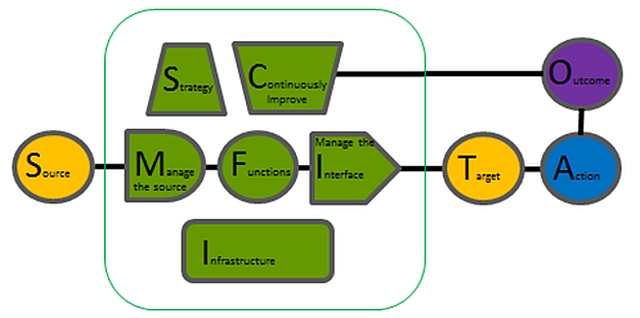
Personality & technical knowledge management systems research: Research design [Personality & TKMS series]
This is part 16 of a series of articles featuring edited portions of Dr. Maureen Sullivan’s PhD dissertation.
The personality and technical knowledge management systems study is based on quantitative research methods. Researchers use quantitative research design to determine what relationship exists, if any, between measured variables. Quantitative research methods are effective at studying large groups of people and making generalizations from a sample1. The quantitative research process involves five main steps2:
- Determining basic questions to be answered by study.
- Determining participants in the study (population and sample).
- Selecting the methods needed to answer questions:
- variables
- measures of the variables
- overall design.
- Selecting analysis tools.
- Understanding and interpreting the results.
One advantage of quantitative methods is their “ability to use smaller groups of people (samples) to make inferences about larger groups (populations) that would be too expensive to study” 3. Consequently, the quantitative research design is suitable for the personality and technical knowledge management systems study because it allows for the collection of data generalization of data to large groups with a smaller sample size. A correlational research design allowed the researcher to determine if there was a relationship between groups and to evaluate that relationship.
Research questions
The research problem was addressed with the following research questions:
Research Question 1: Among users of technical knowledge management systems (TKMS), does neuroticism (personality type) as measured by the five-factor model (FFM), correlate to the acceptance of TKMSs as measured by the technology acceptance model (TAM)?
Research Question 2: Is there a relationship between the extraversion personality type and the acceptance of TKMSs?
Research Question 3: Is there a relationship between the openness personality type and the acceptance of TKMSs?
Research Question 4: Is there a relationship between the conscientiousness personality type and the acceptance of TKMSs?
Research Question 5: Is there a relationship between the agreeableness personality type and the acceptance of TKMSs?
Research sample
The target population of interest for the personality and technical knowledge management systems study was technical knowledge management system (TKMS) users in various government, academia, professional and commercial organizations. The study was accessible to those users of technical KMSs. The large nature of this target population requires that specific criteria to the target population to achieve a more accurate sampling frame4.
The sample frame must meet the following criteria:
- Be consultants, researchers, employees or managers that directly use technical KMSs in their daily work.
- Be at least 18 years of age or older.
- Having used a technical KMS with the past one year.
The sample frame must also be members of approximately twenty-six online networking groups and professional knowledge management systems, academia and IS groups. To meet these criteria, the use of social networking sites was considered to obtain the required sample.
There are three criteria that were used to narrow the population to manageable and qualified sample size:
- Selecting members of professional organizations that have members that specialize in knowledge management, psychology, IT, academia and business.
- Selecting members of LinkedIn network site.
- Selecting members of specific groups in LinkedIn related to knowledge management, psychology, IT, academia and business.
The first and third criterion narrows the potential sample to those individuals associated with knowledge management, psychology, IT, academia, and business. The second criterion provides a potential sample that is able to take an online survey. Based on the third criterion, 27 groups were selected from LinkedIn for this study. Additionally, based on the first criterion, two professional organizations, IEEE and SIKM Leaders, were chosen for this study.
Focusing on the 27 LinkedIn groups provides a qualified sample of over 36,000 KM, psychology, IT, academic and business professionals and students. Moreover, posting a link to a survey in the LinkedIn groups did not require approval from the LinkedIn Legal Department. Consequently, the sampling frame was obtained from records of registered members of the twenty-six online networking groups and professional knowledge management system groups, academia, and IS groups.
Social networking websites have increasing become more popular as a method of communicating with other people who share common interests, fields of study or occupations. In fact, a key part of research planning and development is formed by social networks and social media. There are several advantages to using social networking websites for research samples. One advantage is that study participant‘s identity and truthfulness in traditional research is surpassed by using social networks. Users of social networks are usually friends or coworkers, causing them to be more truthful in their responses to survey questions. Additionally, survey research on social network websites allows participants to forward the survey to more people and to spread the survey virally. Another advantage of social network websites is that the potential sample is larger than traditional research platforms because of the capability to reach more people.
IEEE is a professional organization focused on advancing technological innovation and excellence to benefit the global community5. SIKM Leaders Yahoo! Group is a community of knowledge management leaders from global firms, and the group goal is to share experiences and insights on implementing KM programs.
Next edition: Personality & technical knowledge management systems research: Measurement.
References:
- Swanson, R. A., & Holton, E. F. (2005). Research in organizations: Foundations and methods of inquiry. San Francisco: Berrett-Koehler Publishers. ↩
- Swanson, R. A., & Holton, E. F. (2005). Research in organizations: Foundations and methods of inquiry. San Francisco: Berrett-Koehler Publishers. ↩
- Swanson, R. A., & Holton, E. F. (2005). Research in organizations: Foundations and methods of inquiry. San Francisco: Berrett-Koehler Publishers. ↩
- Trochim, W. M. (2001). The research methods knowledge base (2nd ed.). Cincinnati, OH: Atomic Dog. ↩
- IEEE. Author. (2011). About IEEE. IEEE – About IEEE. Retrieved from http://www.ieee.org/about/index.html ↩






